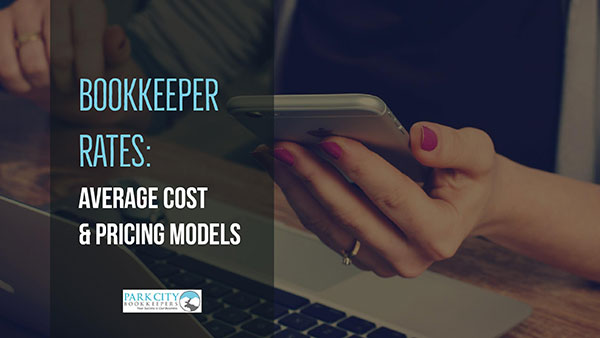Accurate bookkeeping creates the foundation for a successful business. If you are reading this, you may have discovered that your books have issues OR want to ensure that they remain problem free. Either way, it is never too late to get professional help to manage your books. The main reason small and medium enterprises shy away from hiring a professional is cost. Initially, bookkeeper rates may seem steep and discouraging, but the market has evolved, and competitive pricing models are now available to meet varying business needs.
Bookkeeping Fees – Value vs. Cost Analysis
Before we dive into actual bookkeeper rates and pricing models, it is worth looking at a value vs. cost comparison to understand what a professional bookkeeping service can do for you.
#1. Allow you to focus on your business:
Even if you can do your bookkeeping, are familiar with best practices and all the relevant laws and regulations – it may not be the best use of your time. As a business owner, your focus needs to be on growth and your bottom line. Bookkeeping can be tedious and hard to manage, especially as you scale your business. The cost you pay for professional services is well worth the time you get to invest in increasing your profits.
#2. Save on costs in the long run
Even though it may seem like an additional expense, professional bookkeeping services save your business money over the long term. Another responsibility of a bookkeeper is to ensure all your payments are made on time.
If you are handling your books on your own, there is a chance of encountering issues with delayed paperwork and tax filings at some point, leading to late fees and penalties. Often enough, the cost of hiring a bookkeeper ends up paying for itself in the savings you make.
#3. Keep your business inline with laws and regulations
Bookkeeping may seem simple, but it requires a sound understanding and knowledge of both state and national laws and regulations. A relatively minor error such as consistently recording an item in the wrong class of accounts can create issues if your books get audited years down the road.
Months or even years of mistakes, no matter how trivial, tend to pile up and become a nightmare to resolve, not to mention the penalties they can incur. A professional service can help prevent this and keep your business inline with current laws.
Bookkeeping Pricing Models
When you hire a professional bookkeeper, they take responsibility for:
- Maintaining financial records
- Managing client accounts
- Monthly payroll calculations
- Preparing financial statements
- Paying taxes
- Keeping track of accounts receivable and payable
Ultimately, bookkeeping rates for your business will be determined primarily by your requirements and number of transactions.
There are three main pricing models bookkeepers use to charge for their services:
#1. Fixed Fee Services
The current best practice is flat rate pricing. With this model, a bookkeeper will take a look at your accounts to determine what they think is a fair rate for the services you require, and then charge you a fixed monthly rate. The obvious advantage here is that you can easily plan your bookkeeping expenses, and keep your spending in check.
Average Fixed Bookkeeper Rates: On average, you might expect to pay between $500 to $2,500 per month for fixed fee bookkeeping, depending on factors such as the qualifications and experience of the bookkeeper you hire and the number of transactions your business records.
#2. Hourly Billing
As the market for bookkeeping services becomes more competitive, the hourly billing model becoming less popular and less common.
In this model, you pay for the hours a bookkeeper spends working on your accounts. Such a model may work well for businesses with limited requirements, but the obvious disadvantage is that you’ll be paying per hour, regardless of whether they are spent efficiently or not.
Average Hourly Bookkeeper Rates: The industry-wide average would be in the region of $50/hour.
#3. Project Based Pricing
The project-based pricing model is ideal if you hire a bookkeeper to handle a one-off assignment. These projects could be anything, from managing your initial setup to installing and troubleshooting your accounting software or digitizing your books and so on. In such an arrangement, you agree on a price for the duration of the assignment, whether it takes a couple of weeks or months to complete.
Average Project Based Bookkeeper Rates: Depends on the duration and requirements of the project. Generally, costs fall in the range of $250 – $750.
Factors that Can Drive Bookkeeper Rates Higher than Usual:
#1. Messy Books
If you attempt DIY bookkeeping and make a mess during the process, you will first need bookkeeping cleanup services. Typically, bookkeeping cleanup services cost higher than regular bookkeeping.
#2. Bookkeeper’s Credentials and Qualifications
The more experienced and reputable a bookkeeper is, the more likely they are to charge higher prices for their services.
Inexperienced and new bookkeepers may offer lower prices, but you cannot always rely on their services. The best strategy is to find a balance between your business’ requirements and bookkeeper experience.
#3. Time of the Year
Supply and demand influence bookkeeper rates during peak season (Tax Day/End of the fiscal year). You can minimize costs by contracting a bookkeeper earlier in the year. The bookkeeping industry has evolved considerably from the rigid, pricey and hourly billing models to providing more accessible, flexible and personalized services.
You can easily find freelancers to match your business’ needs and workload. However, the industry is now moving towards a payment before service model, and you may be asked to pay 25 – 50% of the fees upfront.
While it is difficult to precisely predict what it will cost you to hire a bookkeeper, with this guide you can now calculate a rough estimate for your particular needs and negotiate bookkeeper rates accordingly for your next hire.

